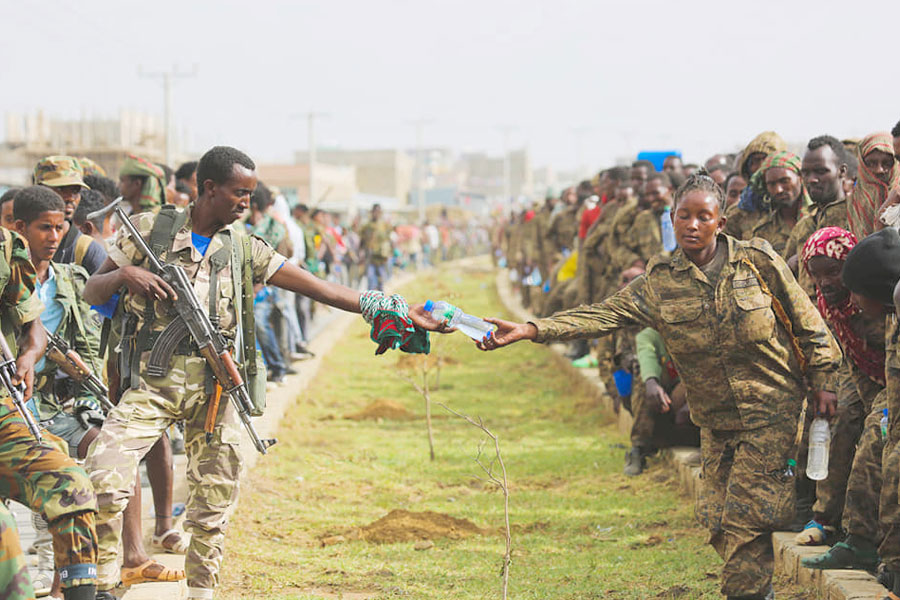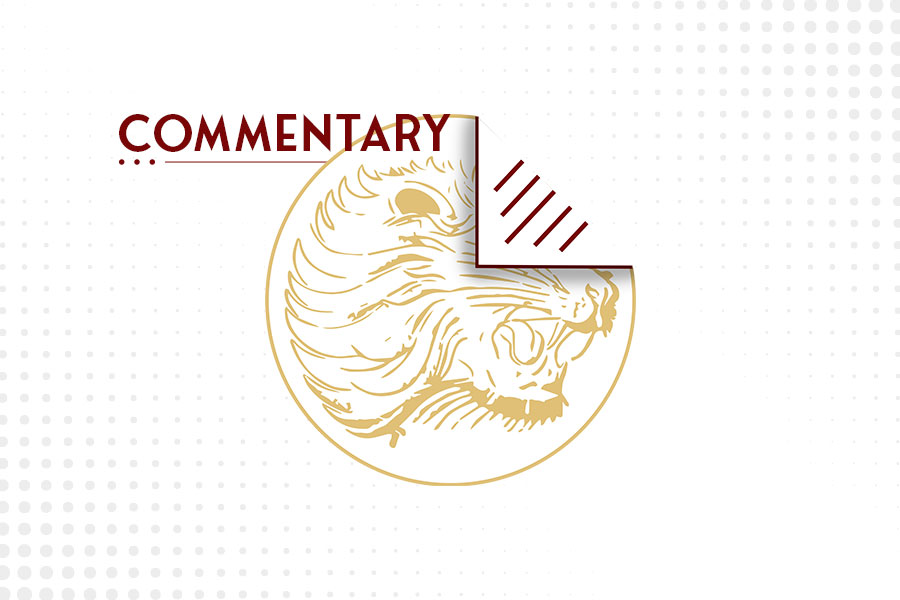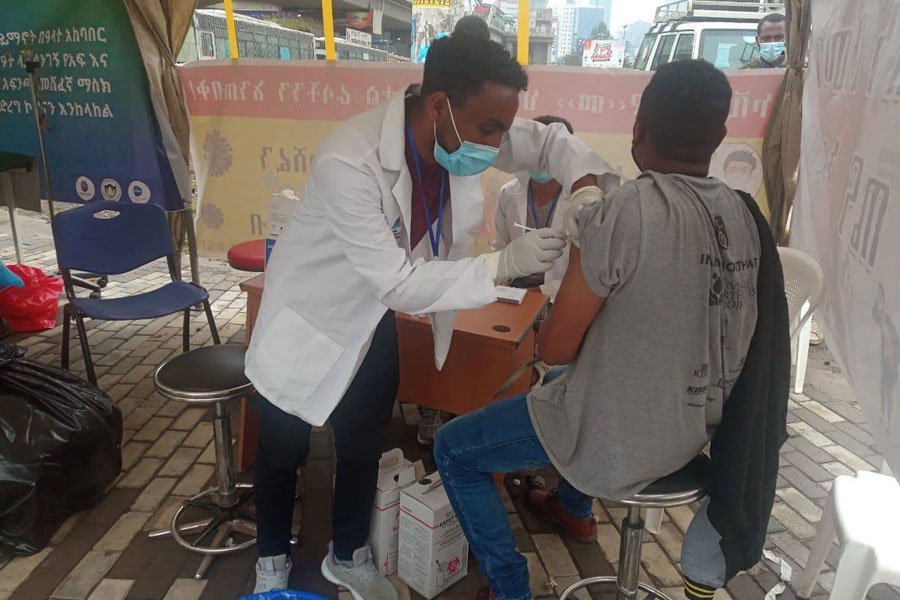
Dec 19 , 2021.
The American journalist and poet Ambrose G. Bierce, also a veteran of the American Civil War, authored the Devil`s Dictionary. He defines peace - rather sardonically - as "a period of cheating between two periods of fighting." Alas! The longing for peace, a phenomenon that describes the Ethiopian population for pretty much of its history, is set in a year after the start of a civil war in the north. Signs of respite and its negotiated resolution remain elusive.
War is an ugly thing. It is even terrible the longer it lasts. The toll on human suffering is disheartening. Short of a negotiated settlement through mediation and compromises, it goes on for years, perhaps even decades. A few countries have experienced organised conflicts perpetually, as Ethiopia has to understand what it means to have an era of stagnation. More lethal weapons abound with a high capacity for destruction. Add to these deeper animosities between the warring parties given that this is a mismanaged political conflict turned into a civil war.
The image of what the country could look like could be glimpsed in the current state of parts of the country that have seen the gruesome fighting. The rules and norms of war are radically different from that of peace, and thus no one is surprised to see robbed banks and looted military bases (not that these are right). The fighting this time around has taken things up a notch, even by the standards of the 17-year civil war during the Dergueera. The constant theme has been combatants' willful destruction of private properties and public infrastructure. Most areas where the conflict has reached have seen large scale destruction of health and education facilities.
The scenes coming out of the Amhara and Afar regional states are a testament to this, as are the images of desecration in Tigray. A chronic food insecure area under times of stability is witnessing communities' dispossessions on a massive scale. The devastation visited on schools and hospitals has put the ‘uncivil’ in Ethiopia’s civil war. The damages incurred by places of worship in a conflict between groups of people that have long claimed piety is mind-boggling.
For a country as poor as Ethiopia, the consequences of deteriorating infrastructure have their bearings on economic development. According to the World Bank, Ethiopia’s quality of overall infrastructure, out of 137 countries, was 94th. The war in the north has most likely sunk the country far down on this list. It also makes the rapid economic development it desperately needs ever harder to attain. Unlike the losses in education and health outcomes, which could not be easily and quickly regained, infrastructure can be re-built. It will take capital, time and will drag down the economy significantly. But it is relatively uncomplicated to replace, especially as most international development institutions have a good record of supporting reconstruction programmes in post-conflict states.
The reversal in economic growth will not be the worst consequence of the war. The horrid prize goes to the devastation on human development and the subsequent impacts on social progress and welfare.
Human development is different, and few countries have painful reminders of this just a generation ago. Unfortunately, short memory prevails among Ethiopia’s political elites. Between its two civil wars, Ethiopia has had nearly three decades of domestic peace without a militarized conflict, bar a war with Eritrea and an intervention in Somalia. Nonetheless, the respite from a civil war since the 1990s has allowed progress on human development.
There is no better way of showing this than the advances made on the Human Development Index (HDI) the United Nations Development Programme (UNDP) uses to measure countries across the three essential indicators: life expectancy, education and income. It is hard to say the index is perfect, for inequalities distort the prevalence of inclusive development. But it provides the most comprehensive measure of the wellbeing of citizens in a given country.
Ethiopians can now, on average, expect to live 20 years older than they had three decades ago, get five more years of education and make three times as much income as they used to. This is far from ideal as the human development levels are one of the lowest in the world. But the achievements in these years is one of the most impressive development success stories of the past half a century. It has allowed most citizens to be far less food insecure, less unhealthy and unskilled than they once were.
The civil war came when the work on the human development front showed positive results even if far from the acceptable levels of the 21st Century. Two areas should be most concerning going forward.
One is education. Children in conflict areas are getting by without schooling, which, if the conflict lasts for years, will have meant rising illiteracy and drags on primary and secondary schooling. They are at risk of falling behind even their sub-Saharan peers. It will mean that once the war is over – whenever that is – there will be an absence of human capital to build back an economy. This could serve as the very reason to slide back into a conflict cycle.
Worse still are the health impacts. Hunger and starvation for those in conflict areas, and lack of adequate access to health facilities for those left behind in a slowing economy, will mean high malnutrition levels. This will be a physical and mental stunt for children under five, which they may never recover from throughout their adult lives. They are unlikely to contribute to development and drain resources either of the state or loved ones that participate in the labour force. Even offspring born in the aftermath of war may not be spared the impacts.
A study by Delan Devakumar and associates titled, “The intergenerational effects of war on the health of children,” finds that they exhibit a form of resilience that is related in turn to their mothers’ wellbeing, quality of caregiving and environmental support.
"But, traumatic events, such as those occurring in a conflict, may override this buffering. For example, children of Australian veterans of the Vietnam war were found to have a suicide rate three times that of the general community, and elevated rates of PTSD and other mental illness have been described in the offspring of Holocaust survivors.”
The civil war in Ethiopia is a little over a year - which is still a year too long. The losses to human development can be recovered in a relatively modest time with concerted efforts. But this will not happen as long as the warring parties deceive themselves that such a war can be won. They may have inflated their sense of ego to the point where they believe that victory is close and that they could already taste its fruits.
Those at the helm and their respective supporters are better off knowing that this is an unwinnable war. With every passing day, they are damning the possibility of any future economic development for the populations - and its wellbeing - they claim to be fighting for.
PUBLISHED ON
Dec 19,2021 [ VOL
22 , NO
1129]

Fortune News | Jul 03,2021

Fortune News | Jun 24,2023

Commentaries | Apr 29,2023

Radar | May 07,2022

Sunday with Eden | Apr 06,2019

Commentaries | Aug 08,2020

Commentaries | Aug 29,2020

My Opinion | Feb 19,2022

Commentaries | Jan 03,2021

Featured | Nov 13,2021

My Opinion | 131674 Views | Aug 14,2021

My Opinion | 128041 Views | Aug 21,2021

My Opinion | 126002 Views | Sep 10,2021

My Opinion | 123625 Views | Aug 07,2021

Dec 22 , 2024 . By TIZITA SHEWAFERAW
Charged with transforming colossal state-owned enterprises into modern and competitiv...

Aug 18 , 2024 . By AKSAH ITALO
Although predictable Yonas Zerihun's job in the ride-hailing service is not immune to...

Jul 28 , 2024 . By TIZITA SHEWAFERAW
Unhabitual, perhaps too many, Samuel Gebreyohannes, 38, used to occasionally enjoy a couple of beers at breakfast. However, he recently swit...

Jul 13 , 2024 . By AKSAH ITALO
Investors who rely on tractors, trucks, and field vehicles for commuting, transporting commodities, and f...

Jun 29 , 2025
Addis Abeba's first rains have coincided with a sweeping rise in private school tuition, prompting the city's education...

Jun 29 , 2025 . By BEZAWIT HULUAGER
Central Bank Governor Mamo Mihretu claimed a bold reconfiguration of monetary policy...

Jun 29 , 2025 . By BEZAWIT HULUAGER
The federal government is betting on a sweeping overhaul of the driver licensing regi...

Jun 29 , 2025 . By NAHOM AYELE
Gadaa Bank has listed 1.2 million shares on the Ethiopian Securities Exchange (ESX),...